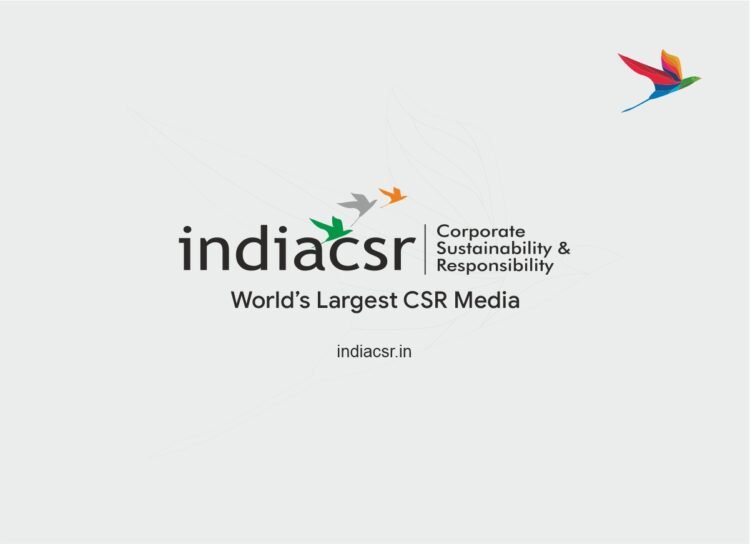Words Rusen Kumar
MUMBAI (India CSR): In an interview with Rusen Kumar, Editor, India CSR and CSR & COMPETITIVENESS; Alka Talwar, Corporate Head – CSR, Tata Chemicals Limited, shared about various CSR projects, vision of the company and views on various contemporary issues in the area of CSR and allied areas.
Brief us about Tata Chemicals Ltd.’s vision, mission and objectives towards sustainability and community development as well as historical backdrop?
TCL believes in a cohesive, inclusive and integrated society, in which all individuals have access to opportunities for personal growth and inclusive economic growth. The present socio-economic environment necessitates a more constructive role by industry for achieving inclusiveness and complementing the ongoing efforts of Government and civil society in enhancing social equity. Tata Chemicals has always considered CSR as an important business driver and has over the years articulated its approach through various policies to drive its CSR agenda. These polices include the Sustainability policy, Community Development policy, Climate Change policy and the Social Accountability policy. Recently, in a bid to ensure a focus on the socially backward communities, the ‘Affirmative Action Policy’ has also been formulated. Our ongoing endeavor is to create sustainable enterprise strategy that is in line with our Mission statement – ‘Serving Society through Science’. As Leader you are responsible for the company’s strategic management and direction.
How Corporate Social Responsibility is attached to your company’s business and operations?
Our Corporate Social Responsibility programmes extend well beyond compliance and incorporate some benchmark practices, now adopted by others within and outside the Group. Sustainability and stakeholder engagement is the very core of our organization. At the heart of our leadership system is the concept of proactively understanding and responding to the needs and expectations of our stakeholders. We sincerely believe that understanding and responding to the needs and expectations of our stakeholders drives the organization towards sustainable business practices. From a humble beginning almost 33 years ago, TCSRD has successfully created an impressive network spread over Gujarat (Mithapur), Uttar Pradesh (Babrala) and West Bengal (Haldia). Our company is constantly endeavoring to further the TATA philosophy of good corporate responsibility. With the spread of our operations now extending beyond India, we have commenced several social responsibility programmes in our overseas locations. The objective of social responsibility is equally well-entrenched in the minds of our employees, who play an active part in empowering rural communities to chart their own development.
Has TCL framed any CSR policy? When it was adopted?
Yes, it has a separate community development policy. It was adopted in November 2000. TCL also has a separate corporate sustainability policy which was adopted in September 2005.
You are in core management team of TCL, which are your focus areas for CSR and related projects initiated under your leadership?
Keeping in mind the geological, environmental, cultural and economic differences of these regions, TCSRD develops and implements programmes tailored to the needs of each region for maximum impact. TCL development interventions are divided into four inter-related components, namely: creating sustainable resource base through natural resource management, promotion of alternate source of energy and environment conservation programmes, building sustainable livelihood through both farm and non-farm based livelihood programme; empowerment by strengthening Community Based Organizations (CBOs) such as SHGs, User groups, Pani Samities, Bhoomi Sudhar committees etc.; improving quality of life through Health, Education and Infrastructure support programme.
What is your Annual CSR budget?
Our annual budget is going on increasing every year. In 2012-13 it was Rs. 9 crores. This budget does not include what we spend on providing health care and education services to the communities through our hospital and schools.
Do you have a CSR team to implement projects?
Yes, at all the three locations we have dedicated community development team which caters to the changing needs of the community around our TCL facility.
Do you have any tradition to publish Annual CSR report?
Yes, we do have the tradition of publishing Annual CSR report.
What are the ongoing CSR projects in various locations?
Our Philosophy is Deeply Rooted in the Principles of Sustainability.
CSR is an important business driver. It leads to what we call responsible business that looks at the profit, people and planet dimensions equally. To create sustainable enterprise, inclusive, cohesive and integrated economic growth is a must where all the individuals have equal access to the opportunities for personal growth.
TCL development interventions are divided into four inter-related components, namely: Creating sustainable resource base through natural resource management, promotion of alternate source of energy and environment conservation programmes, building sustainable livelihood through both farm and non-farm based livelihood programme; Empowerment by strengthening Community Based Organizations (CBOs) such as SHGs, User groups, Pani Samities, Bhomisudhar committees etc; Improving quality of life through Health, Education and Infrastructure support programme.
Kindly share your unique CSR project.
Agriculture development and animal husbandry programme in Babrala; income generation programme through rural entrepreneurship development, vocational training, handicraft promotion, rural BPO at Mithapur and Babrala; pond management and ornamental fish culture at Haldia; Ecoclubs, saving the species like whale shark at Mithapur.
What is your perception about Government of India’s emphasis on CSR?
Intent of government is good and we intend to follow it. The CSR initiatives which have been implemented in all its three locations since past two decades would be continued by the company.
How will you define the Corporate Responsibility in Indian context?
CSR is an important business driver. It leads to what we call responsible business that looks at the profit, people and planet dimensions equally. To create sustainable enterprise, inclusive, cohesive and integrated economic growth is a must where all the individuals have equal access to the opportunities for personal growth. Sustainability has positive impact on overall development of organization.
Do you think that Sustainability needs to be integrated into the heart of business policy and strategy?
Yes, TCL’s corporate philosophy is deeply rooted in the principles of sustainability which implies a commitment to environmental stewardship while adding economic value, promoting human rights and building social capital, all of which are in keeping with a ‘Triple Bottom-line Approach’.
Our sustainability goals cover systems, people and programmes in a manner that combine the four essential dimensions of human, social, environmental and financial benefit. The establishment of the Tata Chemicals Society for Rural Development (TCSRD) emphasizes the company’s commitment in this regard.
What are the recent trends in Sustainability in India in your perspective?
Sustainability and stakeholder engagement is the very core to an organization. Proactively understanding and responding to the needs and expectations of the stakeholders is the key to the success of any organization as this drives the organization towards sustainable business practices.
Why Corporate Social Responsibility issues are becoming more crucial for the business?
For the company to sustain in this competitive environment, CSR issues are very crucial. The present socio-economic environment necessitates a more constructive role by industry for achieving inclusiveness and complementing the ongoing efforts of Government and civil society in enhancing social equity.
Brief us about major CSR initiatives.
We have various ongoing CSR projects like Natural Resources Management, Environment conservation and care programme, Livelihood development programme, improving the quality of life. I want to explain in detail the projects.
Natural Resource Management: Natural Resource Management addresses the issue of direct employment generation through its growth-driving vehicle namely the integrated water management programme, agriculture development programme, pond management and animal husbandry programme. Integrated water management is the key programme of TCSRD in the Mithapur region of Gujarat as non availability of quality water is one of the biggest concerns of this drought prone region.
This programme has helped in creating 246 million cubic feet capacity of water in the parched area of Mithapur and has provided critical irrigation to over 6895 acres of land. 236 medium water harvesting structure like check dams have been built for better percolation and water harvesting 2165 small water harvesting structure like farm ponds, farm bunds has been deepened and salinity pushed back by increasing the underground water buffer 270 drip irrigation and sprinklers and cultivation of crop which is less water intensive have helped in saving and conserving the water. 1702 roof rain water harvesting structures has made portable water available to villagers throughout the year.
The programme has helped in improving the production by 40% and a direct economic gain by Rs. 240-270 lakhs per year. Agriculture growth at Babrala has followed a three pronged strategy i.e. crop diversification, building capacity of farmers and promotion of new modern agricultural systems and technology. Through this programme, 3357 farmers have been benefitted and have got better returns for their toil and sweat. Animal Husbandry is another key programme which provides additional financial support to the farmers below the poverty line. TCSRD supports by providing animal health check up at the door step and also at the animal health clinic, Babrala. Breed improvement, cattle insurance, green fodder demonstrations are some of the other services being provided under this programme.
Environment conservation and care programme: Environment conservation and care programme encompass renewal energy and bio diversity reserve plantation project. Restoration and conservation of coastal ecosystems like coral reef restoration, mangrove plantation and protection of endangered species like whale shark, Asiatic lion have been undertaken in partnership with institutions of excellence like Wild Life Trust of India (WTI), International Union for Conservation of Nature (IUCN). 275 Whale sharks have been rescued till now. Eco clubs have also been formed to create awareness among the community members on environment conservation.
Under the promotion of renewal energy, 31 solar street lights have been installed at public places and 85 solar lanterns have been distributed at Babrala. Energy efficient smokeless stoves are being promoted across locations. 200 such stoves have been installed at Mithapur and Haldia. Eight Biogas plants have also been constructed to generate energy by making proper use of cow dung. The gas is produced by Biogas plants are also being used for cooking food.
Livelihood development programme: Livelihood development programme seeks to strengthen income-generating capacity of marginal farmers who are not adequately covered by the “Natural Resource Management Programme”. It focuses on micro-enterprise development, aimed at building capacities through extensive training, helping identify enterprise opportunities and supporting these activities through micro-finance and marketing.
The main vehicles driving this component are the formulation of Self-Help Groups in villages, the Rural Entrepreneurship Development Programme, skill building through vocational training programme, Uday Foundation (rural BPO) and promotion of rural handicrafts (Okhai). This programme has spurred the self help group members into utilizing their idle savings for investing in an enterprise. It has helped in increasing individual savings leading to enhanced financial security. Collaboration with local training NGO and GOs like Dalit Shakti Kendra, NABARD, and Gram Technology has further strengthened this programme.
So far, 5521 people have undergone skill development training programme across the three locations covering 62 villages. Improving the quality of life : Improving the quality of life which is the base level development component, focuses on health, education and infrastructure, wherein TCSRD helps in improving women and children health care services and infrastructure facilities. By building the capacities and creating awareness, TCSRD has been able to provide the right kind of guidance and facilitation. Villagers are not only willing, but also capable of undertaking developmental work in their villages.
This was most evident in villages covered under the integrated watershed development programme where the farmers were willing to invest as much as Rs.20,000 in pipelines, pump sets, etc. in order to draw water for irrigation from the dam to their fields.
About the Author:
Rusen Kumar is globally renowned journalist writing on CSR issues.
You may also like:
- It is Time We Start Caring for Deprived Children: Pavan Kaushik
- Making CSR Mandatory is Good Philosophy: Canon India CEO
- ECCODiva is an Energy Efficient Ultimate Multi Purpose Solar Light: Satish Jha
- We Want to Showcase CSR Activities: Bhaskar Chatterjee
- Our Dream is to Bring Solar Energy to Reach all Strata of Society : Rajat Bothra, Director, Sunfame India






















